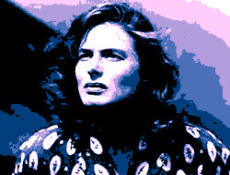Film Review

As it turned out, Ingrid Bergman was the ideal actress to play the female lead in Stromboli. Originally, Rossellini had signed up Anna Magnani (his mistress at the time) for the part, but she would have been hopelessly miscast, too at home in the director's harsh neo-realist landscape to be convincing. Bergman, by contrast, is perfect as the outsider, a statuesque beauty who looks like an alien from another planet when she sets up camp alongside the rough-hewn villagers (all played by non-professional actors) that make up the sparse island community. At Rossellini's insistence, RKO allowed Magnani to headline a film that ended up as a subtle form of revenge, another volcano-themed melodrama, Vulcano (1949), directed by William Dieterle.
Where Rossellini's Stomboli succeeds and Dieterle's Vulcano fails (albeit only just) is in combining the severe aesthetic of Italian neo-realism with the emotionally overcharged false reality of Hollywood melodrama. As both films demonstrate, it is an impossible marriage and the only reason Rossellini gets away with it is because his star actress possesses a unique ability to straddle both worlds. Bergman may look every inch the Hollywood glamour girl, but beneath the gloss there is a raw, bitter truth that is every bit as stark as the austere volcanic backwater she is thrown into. The fact that Bergman had to improvise many of her scenes in the film (as Rossellini disliked the enforced rigour of scripts) allowed her to turn in a far richer, far more nuanced performance than she could ever have done in a conventional Hollywood set up. And who can fail to be moved by the fate of her character as she makes her hopeless attempt to traverse the sulphurous fumes of the volcano in a desperate bid for freedom?
Had the critical climate been a little kinder to Bergman, Rossellini and the vagaries of the human heart, Stromboli would have been received in a far more positive light. As it was, carelessly trimmed by its American backer RKO (at the insistence of producer Howard Hughes) from 107 to 81 minutes, and then released amid a storm of controversy as Bergman married Rossellini and gave birth to his son, the film didn't stand much of a chance. To this day, it is considered an inferior example of Rossellini's work, overshadowed by his neo-realist masterpieces: Roma, città aperta (1945), Paisà (1946) and Germania anno zero (1948). Yet, not unlike Bergman's real-life union with Rossellini, Stromboli does achieve a kind of magical synthesis between two seemingly ill-matched opposites. Rossellini would subsequently make five more films with Bergman (including Viaggio in Italia, Giovanna d'Arco al rogo and La Paura), but none of these has quite the daring and emotional power of Stromboli.
Here, Rossellini films his domestic melodrama in a way that makes it appear every bit as real and brutal as the harsh lives of the peasant folk on his lava-showered island. Scenes such as those depicting fishermen at work (strikingly similar to those in Luchino Visconti's La Terra trema, 1948), at first appear disconnected from the world in which the heroine lives, one founded on empty dreams of a better life far away. But, as the film nears its devastating climax, the two separate realities (one external, the other internal) fuse and become one, with the heroine finally realising (perhaps) that true happiness is to be found in the home that Fate has granted her, not in some distant, unattainable haven on the other side of the volcano. For Bergman, things would turn out differently. Seven years on, her marriage to Rossellini over, she would be back in Hollywood, as if she had never been away.
© James Travers 2013
The above content is owned by frenchfilms.org and must not be copied.
Film Synopsis
In the immediate aftermath of World War II, a young Lithuanian refugee, Karin, meets an Italian fisherman, Antonio, in a camp for displaced persons. The two marry and agree to settle down in Antonio's home village, on the volcanic island of Stromboli, off the coast of Sicily. Almost immediately after their arrival on the sparsely populated island Karin feels alone and alienated. Her only friends are the village priest and a man who works at the nearby lighthouse. Not long after she learns she is pregnant, Karin makes up her mind to leave the island, but Antonio refuses to let her go...© James Travers
The above content is owned by frenchfilms.org and must not be copied.
Similar Films
Here are some other films you may enjoy watching:- L'Homme au chapeau rond (1946)
- The Grapes of Wrath (1940)
- The Life of Oharu (1952)
- Terrain vague (1960)
- Ladri di biciclette (1948)
Other related links:
Film Credits
- Director: Roberto Rossellini
- Script: Roberto Rossellini (story), Art Cohn, Sergio Amidei, Gian Paolo Callegari, Renzo Cesana, Félix Morlión
- Cinematographer: Otello Martelli
- Music: Renzo Rossellini
- Cast: Ingrid Bergman (Karin), Mario Vitale (Antonio), Renzo Cesana (The Priest), Mario Sponzo (The man from the lighthouse), Gaetano Famularo (Man with guitar), Roberto Onorati (Man)
- Country: Italy / USA
- Language: Italian / English / Spanish
- Support: Black and White
- Runtime: 103 min
The best French Films of the 1920s

The best of American film noir

The very best of French film comedy
